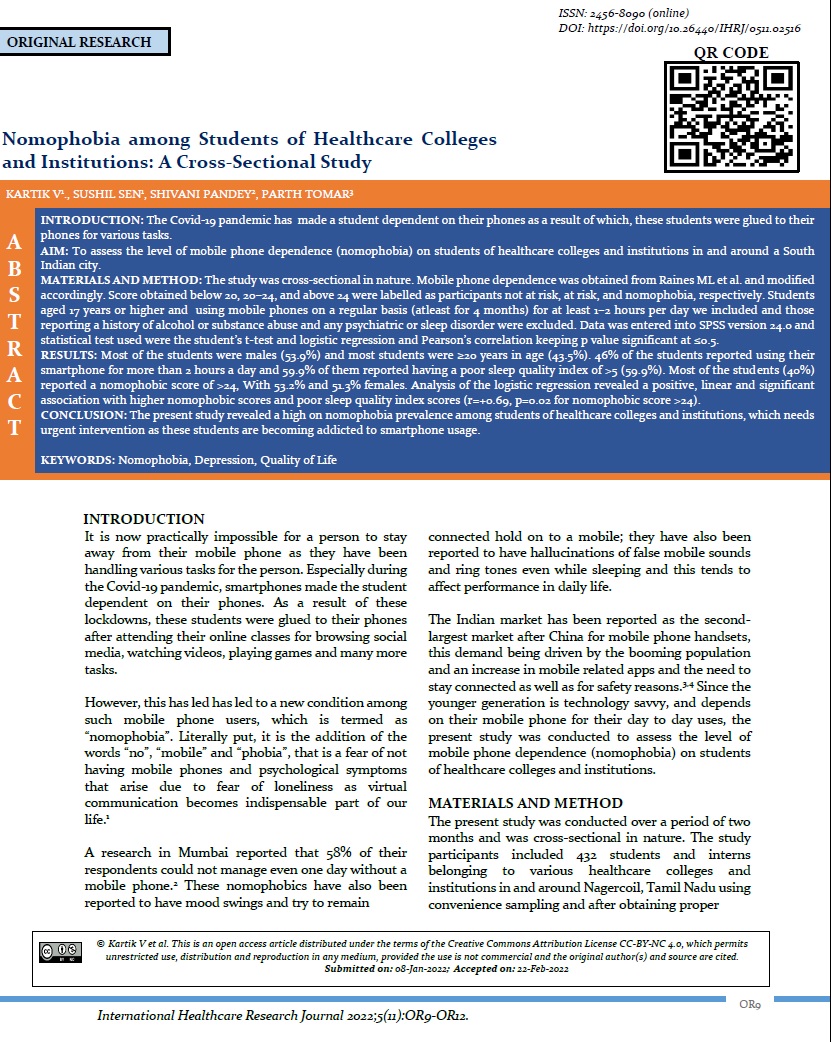Nomophobia among Students of Healthcare Colleges and Institutions: A Cross-Sectional Study
Abstract
INTRODUCTION: The Covid-19 pandemic has made a student dependent on their phones as a result of which, these students were glued to their phones for various tasks. AIM: To assess the level of mobile phone dependence (nomophobia) on students of healthcare colleges and institutions in and around a South Indian city. MATERIALS AND METHOD: The study was cross-sectional in nature. Mobile phone dependence was obtained from Raines ML et al. and modified accordingly. Score obtained below 20, 20–24, and above 24 were labelled as participants not at risk, at risk, and nomophobia, respectively. Students aged 17 years or higher and using mobile phones on a regular basis (atleast for 4 months) for at least 1–2 hours per day we included and those reporting a history of alcohol or substance abuse and any psychiatric or sleep disorder were excluded. Data was entered into SPSS version 24.0 and statistical test used were the student’s t-test and logistic regression and Pearson’s correlation keeping p value significant at ≤0.5. RESULTS: Most of the students were males (53.9%) and most students were ≥20 years in age (43.5%). 46% of the students reported using their smartphone for more than 2 hours a day and 59.9% of them reported having a poor sleep quality index of >5 (59.9%). Most of the students (40%) reported a nomophobic score of >24, With 53.2% and 51.3% females. Analysis of the logistic regression revealed a positive, linear and significant association with higher nomophobic scores and poor sleep quality index scores (r=+0.69, p=0.02 for nomophobic score >24). CONCLUSION: The present study revealed a high on nomophobia prevalence among students of healthcare colleges and institutions, which needs urgent intervention as these students are becoming addicted to smartphone usage.
Downloads
References
Sureka V, Abeetha S, Suma S, Subramanian S, Brinda S, Bhagyashree N, Ramya K, Ganesh M. Prevalence of nomophobia and its association with stress, anxiety and depression among students. Biomedicine 2020; 40(4):522-5.
Macro - market analysis and consumer research organization. A report on study of mobile phone usage among the teenagers and youth in Mumbai. Apr-May 2004.
Yildirim C, Correia AP. Exploring the dimensions of nomophobia: Development and validation of a self-reported questionnaire. Computers in Human Behavior. 2015;49:130-7.
De' R, Pandey N, Pal A. Impact of digital surge during Covid-19 pandemic: A viewpoint on research and practice. Int J Inf Manage. 2020;55:102171. https://doi.org/10.1016/j.ijinfomgt.2020.102171.
Nomophobia is the fear of being out of mobile phone contact and it’s the plague of our 24/7age article of NEWS and current affairs. Available from: http://www.thisislondon.co.uk/news/article-23468919-details.
Mallya NV, Kumar DRS, Mashal S. A study to evaluate the behavioral dimensions of “Nomophobia” and attitude toward smartphone usage among medical students in Bengaluru. Natl J Physiol Pharm Pharmacol. 2018;8(11):1553-7.
Mengi A, Singh A, Gupta V. An institution-based study to assess the prevalence of Nomophobia and its related impact among medical students in Southern Haryana, India. J Family Med Prim Care 2020;9:2303-8.
Choudhury S, Saha I, Som TK, Ghose G, Patra M, Paul B. Mobile phone involvement and dependence among undergraduate medical students in a Medical College of West Bengal, India. J Educ Health Promot 2019:29:1.
Dasgupta P, Bhattacherjee S, Dasgupta S, Roy JK, Mukherjee A, Biswas R. Nomophobic behaviors among smartphone using medical and engineering students in two colleges of West Bengal. Indian J Public Health 2017;61:199‑204.
Anju PT, Aswathy KS, Athira S, Athulya N. Mobile phone dependence and sleep quality among undergraduate students. Indian J Forensic Med Toxicol 2019;13:11‑5.

Copyright (c) 2022 Kartik V. et al.

This work is licensed under a Creative Commons Attribution-NonCommercial 4.0 International License.


